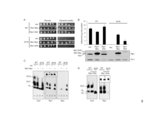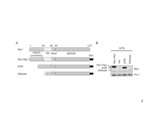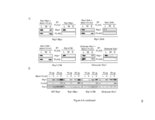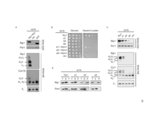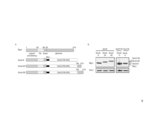| Title |
Chaperone-mediated insertion of the rieske iron-sulfur protein into respiratory complex III |
| Publication Type |
dissertation |
| School or College |
School of Medicine |
| Department |
Biochemistry |
| Author |
Smith, Pamela Marie |
| Date |
2012-05 |
| Description |
Cellular respiration refers to the production of biochemical energy in theform of adenosine triphosphate (ATP) to use in cellular energy-requiringprocesses. The reactions involved in respiration utilize redox chemistry (oxidation of one molecule and subsequent reduction of another); prosthetic groups located within protein complexes in the inner mitochondrial membrane serve as the redox carriers to oxygen as a terminal electron acceptor. Passage of electrons is coupled to the translocation of protons across the inner membrane to establish the electrochemical gradient that drives ATP synthesis. Each respiratory complex is composed of many protein subunits. The bc1 complex is an essential component of the electron transport chain and exists as an obligate dimer in eukaryotic mitochondria. The functional bc1 complex contains up to eight supernumerary subunits in addition to the three redox subunits that make up the catalytic core. In order to help facilitate the coordinated assembly of such large protein complexes, a number of dedicated assembly factors have been identified for each respiratory complex. We identified Mzm1, a novel protein of the mitochondrial matrix, in a genetic screen for proteins that affect mitochondrial metal pools that are used for metallation of the respiratory complexes and other mitochondrial enzymes. Cells lacking Mzm1 exhibit a respiratory growth defect and reduced mitochondrial zinc levels. However, we determined that the growth defect is attributed to the function of Mzm1 in facilitating insertion of the catalytic Rieske Fe/S (Rip1) protein into the bc1 complex at a late stage of assembly. We also determined that the reduced mitochondrial zinc levels are a general effect of mutations affecting bc1 complex assembly and are not a unique phenotype attributed to Mzm1. Rather, Mzm1 appears to stabilize the Rip1 subunit prior to insertion into the bc1 complex by its interaction with the C-terminal residues of Rip1. We also show that the C-terminus of Rip1 is important for recognition of Rip1 by the inner membrane translocase, Bcs1. Since Mzm1 interacts with Rip1 just prior to extrusion into the inner membrane, the stabilization of Rip1 by Mzm1 may aid in the presentation of Rip1 to Bcs1. |
| Type |
Text |
| Publisher |
University of Utah |
| Subject MESH |
Adenosine Triphosphate; Electron Transport; Oxidative Phosphorylation; Organelle Biogenesis; Mitochondrial Membrane Transport Proteins; Oxidation-Reduction; Mitochondrial Membranes; Electrons; Protons; Mitochondrial Proton-Translocating ATPases; Molecular Chaperones; Metalloproteins; Mitochondrial Proteins; Yeast, Dried; Zinc; Plasmids |
| Dissertation Institution |
University of Utah |
| Dissertation Name |
Doctor of Philosophy |
| Language |
eng |
| Relation is Version of |
Digital reproduction of Chaperone-Mediated Insertion of the Rieske Iron-Sulfur Protein into Respiratory Complex III. Print version available at J. Willard Marriott Library Special Collections. |
| Rights Management |
Copyright © Pamela Marie Smith 2012 |
| Format |
application/pdf |
| Format Medium |
application/pdf |
| Format Extent |
5,358,685 bytes |
| ARK |
ark:/87278/s6pw06qk |
| Setname |
ir_etd |
| ID |
1199188 |
| Reference URL |
https://collections.lib.utah.edu/ark:/87278/s6pw06qk |






























































